|
|
|
Sort Order |
|
|
|
Items / Page
|
|
|
|
|
|
|
| Srl | Item |
| 1 |
ID:
158381
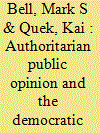

|
|
|
|
|
| Summary/Abstract |
The “democratic peace”—the regularity that democracies rarely (if ever) fight with other democracies but do fight with nondemocracies—is one of the most famous findings in international relations scholarship. There is little agreement, however, about the mechanism that underpins the democratic peace. Recently, scholars have shown that mass publics in liberal democracies are less supportive of using military force against other democracies. This finding has been taken to support the idea that the content of public opinion may provide one mechanism that underpins the democratic peace. Using a large-scale survey experiment, we show that mass publics in an authoritarian regime—China—show the same reluctance to use force against democracies as is found in western democracies. Our findings expand the empirical scope of the claim that mass publics are reluctant to use force against democracies, but force us to rethink how public opinion operates as a causal mechanism underpinning the democratic peace.
|
|
|
|
|
|
|
|
|
|
|
|
|
|
|
|
| 2 |
ID:
158380
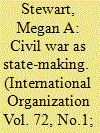

|
|
|
|
|
| Summary/Abstract |
Why do some rebel groups provide governance inclusively while most others do not? Some insurgencies divert critical financial and personnel resources to provide benefits to anyone, including nonsupporters (Karen National Union, Eritrean People's Liberation Front). Other groups offer no services or limit their service provision to only those people who support, or are likely to support, the insurgency. The existing literature examines how insurgencies incentivize recruitment by offering selective social services, yet no research addresses why insurgencies provide goods inclusively. I argue that inclusive provision of services legitimates insurgents’ claim of sovereignty to domestic and international audiences, and thus is a strategic tool secessionist rebels use to achieve their long-term goal of independence. With new and original data, I use a large-N analysis to test this hypothesis. The results of the analysis support the hypothesis, underscoring the importance insurgent nonviolent behavior and addressing key issues such as sovereignty and governance.
|
|
|
|
|
|
|
|
|
|
|
|
|
|
|
|
| 3 |
ID:
158374
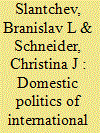

|
|
|
|
|
| Summary/Abstract |
International cooperation can fail even though governments have no distributional conflicts or incentives to free-ride, face no informational or credibility problems, and even agree on the policies that need to be implemented. Germany's refusal to cooperate with the Eurogroup members on the Greek bailout in 2010 until the crisis threatened to derail the entire Eurozone is puzzling in that regard especially because Germany is the main beneficiary of the euro. It was alleged at the time that this was a dilatory tactic designed to postpone a domestically unpopular decision until after crucial regional elections. But why would voters allow themselves to be misled like that? And why did Merkel agree to the bailout before the elections took place? To analyze how citizen preferences affect international cooperation, we develop a game-theoretic model of the four-way interaction between two governments that must coordinate a response to a crisis affecting both countries but who also must face the polls domestically with an electorate that might be uncertain whether a response is necessary. We find that, paradoxically, governments that stand to receive the greatest benefits from international cooperation face the greatest obstacles to implementing the required policies even when voters would want them to. We show how the model can rationalize Merkel's electoral strategy and why her party suffered at the polls when the strategy went off the rails.
|
|
|
|
|
|
|
|
|
|
|
|
|
|
|
|
| 4 |
ID:
158377
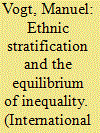

|
|
|
|
|
| Summary/Abstract |
Why are ethnic movements more likely to turn violent in some multiethnic countries than in others? Focusing on the long-term legacies of European overseas colonialism, I investigate the effect of distinct ethnic cleavage types on the consequences of ethnic group mobilization. The colonial settler states and other stratified multiethnic states are characterized by an equilibrium of inequality in which historically marginalized groups lack both the organizational strength and the opportunities for armed rebellion. In contrast, ethnic mobilization in the decolonized states and other segmented multiethnic societies is more likely to trigger violent conflict. I test these arguments in a global quantitative study from 1946 to 2009, using new data on the linguistic and religious segmentation of ethnic groups. The results confirm that the extremely unequal colonial settler states experience less violence than the decolonized states and other multiethnic countries. Ethnic conflict is generally more likely the more segmented and less hierarchically structured multiethnic states are. Specifically, stable between-group hierarchies reduce the risk of governmental conflict, whereas segmentation affects secessionist violence.
|
|
|
|
|
|
|
|
|
|
|
|
|
|
|
|
| 5 |
ID:
158375
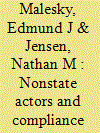

|
|
|
|
|
| Summary/Abstract |
International relations scholarship has made great progress on the study of compliance with international agreements. While persuasive, most of this work has focused on states’ de jure compliance decisions, largely excluding the de facto behavior of nonstate actors whose actions the agreement hopes to constrain. Of particular interest has been whether the OECD Anti-Bribery Convention (ABC) might reduce the propensity of multinational corporations (MNCs) to bribe officials in host countries through its mechanisms of extraterritoriality and extensive peer review. Unfortunately, research is hampered by reporting bias. Since the convention raises the probability of investors’ punishment for bribery in their home countries, it reduces both the incentives for bribery and willingness to admit to the activity. This generates uncertainty over which of these incentives drives any correlation between signing the convention and reductions in reported bribery. We address this problem by employing a specialized survey experiment that shields respondents and reduces reporting bias. We find that after the onset of Phase 3 in 2010, when the risk of noncompliance increased for firms subject to the OECD-ABC, those MNCs reduced their actual bribery relative to their nonsignatory competitors.
|
|
|
|
|
|
|
|
|
|
|
|
|
|
|
|
| 6 |
ID:
158378
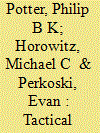

|
|
|
|
|
| Summary/Abstract |
Militant groups, like all organizations, carefully consider the tactics and strategies that they employ. We assess why some militant organizations diversify into multiple tactics while others limit themselves to just one or a few. This is an important puzzle because militant organizations that employ multiple approaches to violence are more likely to stretch state defenses, achieve tactical success, and threaten state security. We theorize that militant organizations respond to external pressure by diversifying their tactics to ensure their survival and continued relevance, and that the primary sources of such pressure are government repression and interorganizational competition. We find consistent support for these propositions in tests of both the Global Terrorism Database (GTD) and Minorities at Risk Organizational Behavior (MAROB) data sets. We bolster these findings with an additional specification that employs ethnic fractionalization in the first stage of a multi-process recursive model. These findings are relevant not only for academic research but for policy as well. While it is difficult for countries to anticipate the character of future tactical choices, they may be able to anticipate which groups will most readily diversify and thereby complicate counterterrorism efforts.
|
|
|
|
|
|
|
|
|
|
|
|
|
|
|
|
| 7 |
ID:
158376


|
|
|
|
|
| Summary/Abstract |
UN peacekeeping was not designed to wield force, and the UN's permanent five (P-5), veto-wielding Security Council members do not want the UN to develop a military capacity. However, since 1999, the UN Security Council has authorized all UN multidimensional peacekeeping operations under Chapter VII of the UN Charter to use force. The mandates do not serve to achieve the council's stated goal of maintaining international peace, nevertheless, the council repeats these mandates in every multidimensional peacekeeping resolution. Neither constructivist accounts of normative change, nor the rational pursuit of stated goals, nor organizational processes can explain the repetition of force mandates. Instead, we draw on insights from small-group psychology to advance a novel theoretical proposition: the repetition of force mandates is the result of “group-preserving” dynamics. The P-5 members strive to maintain their individual and collective status and legitimacy by issuing decisions on the use of force. Once members achieve a decision, the agreement is applied in future rounds of negotiations, even when the solution does not fit the new context and may appear suboptimal, illogical, or even pathological. Privileging the achievement and reproduction of agreement over its content is the essence of group preserving. We present an original data set of all peacekeeping mandates, alongside evidence from dozens of interviews with peacekeeping officials, including representatives of all of the Security Council's permanent members. We assess this original data using expected causal process observations derived from rationalist, constructivist, organizational, and psychological logics.
|
|
|
|
|
|
|
|
|
|
|
|
|
|
|
|
| 8 |
ID:
158379


|
|
|
|
|
| Summary/Abstract |
In this paper I examine what constructivist approaches to IR tell us about how states should act when confronted by atrocity crimes in the context of a politically pluralist international society. Building on the work of theorists who responded to Richard Price and Christian Reus-Smit's call to substantiate the constructivist's claim to explain “moral progress,” and to better inform normative assessments, I claim that the constructivist emphasis on historical and social contingency does not rule out ethical standpoints, suggesting instead a “pragmatic” ethic. Norms are hypotheses rather than absolute values. The task of the pragmatic constructivist is not to establish beyond doubt the normativity of a norm—the task is to test the norm for how well its “meaning-in-use” supports action that ameliorates lived social problems. Pragmatic constructivists can commit to the Responsibility to Protect (R2P) as an idea that might reconcile various communities of normative practice and ameliorate vulnerability without upsetting international order. To the extent particular practices (e.g., prevention) have proven (and continue to prove) useful in doing this, pragmatic constructivists can equate the institutionalization of those practices with normative progress. However, R2P is a “complex” norm. It recognizes that knowledge of how to respond to ongoing atrocity is context specific and cannot therefore be fixed. The task of the pragmatic constructivist here is to assess the practical judgment of those that claim to speak for the norm by weighing the consequences of acting out their prescription in the specific context of a particular crisis. I test the meanings of R2P in use during the Syria crisis from 2011 to 2012. R2P was problematic to the extent certain meanings reinforced policy ends (e.g., protection through political/criminal accountability) that were impractical and pursued at the expense of non-ideal but realizable goals (e.g., protection through peace/aid).
|
|
|
|
|
|
|
|
|
|
|
|
|
|
|
|
|
|
|
|
|